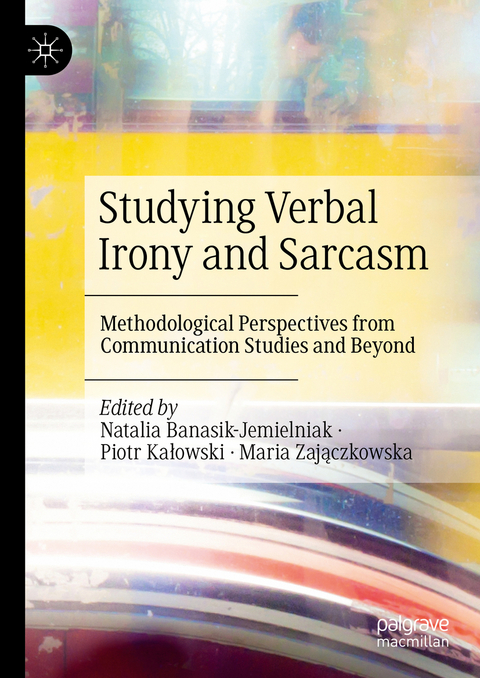
Studying Verbal Irony and Sarcasm
Springer International Publishing (Verlag)
978-3-031-57171-8 (ISBN)
This volume provides a comprehensive yet accessible introduction to the phenomenon of verbal irony and sarcasm and the methodological aspects of its study. The chapters employ quantitative and qualitative measures of the use of verbal irony and sarcasm in both adults and children, with methods ranging from questionnaires and comment elicitation through experimental studies to a qualitative analysis of naturalistic data. By examining the phenomena in a range of contexts, the volume also show that cultural norms of communication may affect both the use and understanding of irony in specific ways and should therefore be taken into account in research.
Natalia Banasik-Jemielniak is an assistant professor at the Institute of Psychology at The Maria Grzegorzewska University in Warsaw (Poland). She studies topics at the intersection of linguistics and psychology, with a special interest in irony studies.
Piotr Kalowski is an assistant professor at the University of Economics and Human Sciences in Warsaw. His research interests chiefly focus on the individual differences in verbal irony.
Maria Zajaczkowska is a lecturer in the School of Psychology at the University of Economics and Human Sciences in Warsaw (Poland). Verbal irony comprehension and use have always been a major focus of her research interests.
1: Introduction, Natalia Banasik-Jemielniak, Piotr Kalowski, Maria Zajaczkowska.- Part I. Theoretical Considerations on Irony Research.- 2: On Verbal Irony Methods: Giving an Old Dog Some New Tricks, Herbert L. Colston.- 3: A Minimal Account of Irony, A Minimal Account of Irony, Joana Garmendia.- 4: Rethinking (Assumptions About) Irony: The Bilingual Factor, Katarzyna Bromberek-Dyzman.- Part II. Irony Research - Developmental Perspective.- 5: Experiments on the Development of Irony. Walking Through a Methodological Maze, Ana Milosavljevic.- 6: Verbal Irony and Gossip Appreciation Among Children and Adults in Poland and Canada, Marta Krygier-Bartz, Melanie Glenwright, Penny M. Pexman.- 7: Investigating Irony Comprehension in Children: Methods, Challenges, and Ways Forward, Ingrid Lossius Falkum, Franziska Köder.- 8: The Influence of Intentional and Accidental Moral Transgressions on Children's Understanding of Verbal Irony, Vera Hukker, Simone Sprenger, Petra Hendriks.- Part III. Irony Research - Adult.- 9: The Form and Content of Vignette Stimuli in Irony Research with Adult Participants, Piotr Kalowski, Katarzyna Branowska.- 10: Exploring the Polish Adaptation of the Sarcasm Self-Report Scale Using the Think Aloud Protocol: Three Lessons About Studying Irony Through Questionnaires, Maria Zajaczkowska, Olga Zimna, Malwina Kurzawa, Natalia Banasik-Jemielniak.- 11: Humorous Irony in Female Stand-Up Comedy: A Sociopragmatic Analysis, Esther Linares Bernabéu.- 12: Irony Across Cultures - A Contrastive Analysis of Conceptualizations and Social Functions, Francesca Ervas, Zsuzsanna Schnell.- 13: Examining the Structure of the Sarcasm Self-Report Scale Cross-Culturally: Evidence from Canada, Poland, and Türkiye, Julia Kuczmierowska, Duygu Kandemirci-Bayiz, Büsra Akdeniz, Yasemin Abayhan, Maria Zajaczkowska, Melanie Glenwright, Penny M. Pexman, Natalia Banasik-Jemielniak.- 14: "Am I Glad To See Myself?" - The Self-Irony Tendency Task as a Measure of the Tendency to Use Verbal Self-Irony for Self-Presentation Purposes, Aleksandra Siemieniuk, Lukasz Malanowski.- 15: I Will Act As If I Understand Irony Better - The Relationship Between the Histrionic Self-Presentation Style and the Interpretation And Appreciation of Verbal Irony, Agnieszka Fanslau.- 16: Further Directions: Overcoming the Bias of Research Published in English, Further Directions: Overcoming the Bias of Research Published in English, Piotr Kalowski, Natalia Banasik-Jemielniak, Maria Zajaczkowska, Agnieszka Sroka, Edwar Makhoul, Ewa Dryll.
| Erscheinungsdatum | 18.06.2024 |
|---|---|
| Zusatzinfo | XXII, 373 p. 22 illus., 13 illus. in color. |
| Verlagsort | Cham |
| Sprache | englisch |
| Maße | 148 x 210 mm |
| Themenwelt | Geisteswissenschaften ► Sprach- / Literaturwissenschaft ► Sprachwissenschaft |
| Sozialwissenschaften ► Kommunikation / Medien ► Kommunikationswissenschaft | |
| Sozialwissenschaften ► Kommunikation / Medien ► Medienwissenschaft | |
| Schlagworte | Communication • Irony • Language interaction • non-literal language • psycholinguistic methods • rhetoric • Sarcasm |
| ISBN-10 | 3-031-57171-1 / 3031571711 |
| ISBN-13 | 978-3-031-57171-8 / 9783031571718 |
| Zustand | Neuware |
| Informationen gemäß Produktsicherheitsverordnung (GPSR) | |
| Haben Sie eine Frage zum Produkt? |
aus dem Bereich


